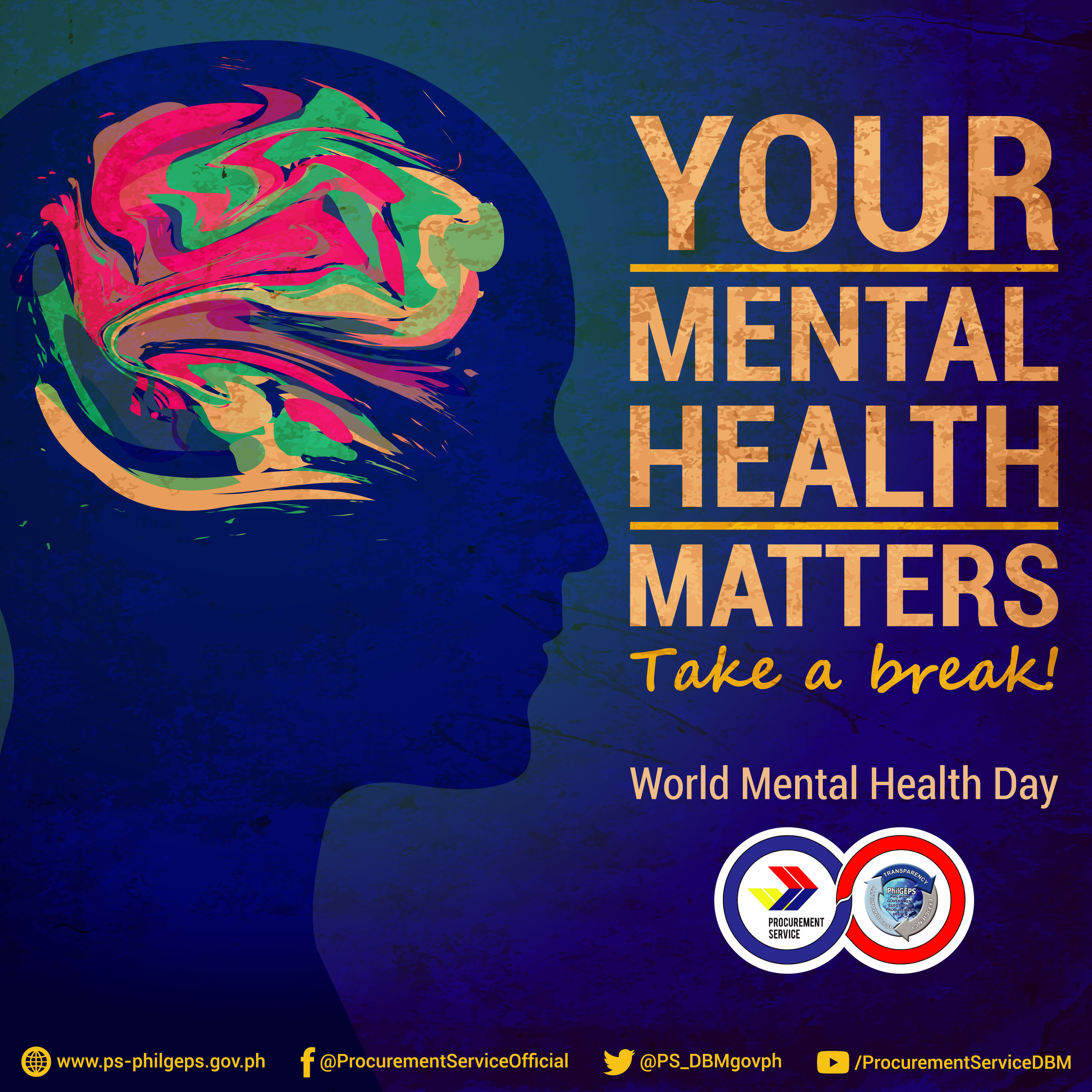
In commemoration of the World Mental Health Day celebrated every October 10, PS-DBM reminds that mental health matters.
The Procurement Service establishes its Mental Health Program in a bid to promote and protect overall wellness of all its officials and employees.
The thought of abruptly waking up one day, gasping for air and clinging to life, haunted Maximillian* during his stay at a COVID-19 quarantine facility in Quezon City.
On March 23, 2020—following a pre-evaluation for having fever—Maximillian was confirmed to have contracted the viral disease. Back then, he was among the first confirmed cases of COVID-19 in the Procurement Service of the Department of Budget and Management (PS-DBM).
At a time when even experts had little to no information about this new strain of coronavirus, Maximillian was initially more surprised than terrified.
“Hindi nga? Wala naman akong nararamdamang kakaiba,” he remembers saying.
But his disbelief eventually turned into crippling existential dread, as soon as symptoms like cough, sore throat, diarrhea, and body aches began manifesting.
“I’m too young to die,” he recalls telling himself countless times, his mind was filled with just as many what-ifs.
At 37, Maximillian still has his eyes set on future aspirations. The onslaught of COVID-19, however, resulted in overwhelming reservations. Over time, doubts turned to fears, and fears triggered anxieties.
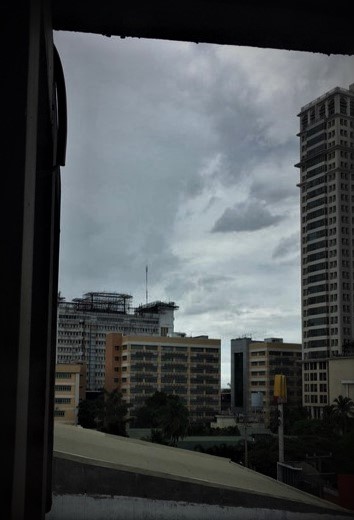 A clear view of the sky is what Maximillian sees when he peeks out of the window of Quarantine Room 506 in a Quezon City COVID-19 facility.
A clear view of the sky is what Maximillian sees when he peeks out of the window of Quarantine Room 506 in a Quezon City COVID-19 facility.
Amid this panic-inducing pandemic, it is not only the physical well-being that people must look after, as mental health is highly likely to also deteriorate. According to the World Health Organization, around 450 million individuals live with mental disorders that are among the leading causes of disability worldwide.
Cognizant of this, and in relation to Philippine Republic Act 11036 otherwise known as the Mental Health Act, PS-DBM commits itself to promote and protect holistic wellness of its employees by establishing a comprehensive, effective, and efficient Mental Health Program (MHP) through Office Order 106-20 issued on August 14, 2020.
Ultimately, MHP aims to integrate mental health initiatives in all organizational development policies of PS-DBM. This will ensure that every employee is consciously aware and sensitive to mental health issues in the workplace.
The coverage of MHP excludes no one. It applies to all officials and personnel of PS-DBM—in the same sense that COVID-19 and mental disorders can affect anyone regardless of position and employment status.
This proves to be true when Divine*, a female personnel who holds a supervisory position in PS-DBM, tested positive for COVID-19 sometime in June. Prior to learning the result, she knew it was more than a mere flu when she felt heaviness in her chest, became weak, lost her appetite, and was always sleepy.
What haunted Maximillian in his sleepless nights at the quarantine site was exactly the same thing that tormented Divine. Only this time, the harrowing thoughts took a physical form that appeared right before her eyes.
“I could not get my mind off several terrifying hospital scenes that I witnessed while at the ER (Emergency Room)—code blue cases; people in tears as probably their loved one is on critical stage or had died,” Divine recalls.
With no available room for admission at a hospital in Las Piñas City where the swab test took place, Divine asked to be sent home, went into a complete isolation, and began her recuperation.
Recovery, as much as it is hopeful, does not always guarantee peace of mind.
“I worried for my family. I prayed I didn’t infect my son, my mom, or anyone in my home,” Divine looks back.
The MHP, as part of its information and education campaigns, intends to roll out mental health wellness activities such as regular stress management and debriefing for employees who “suffered tragic, traumatic, and stressful life event or experience.”
Furthermore, MHP targets to include mental health assessment in the conduct of PS-DBM Annual Physical Examination. A quarterly report on MHP deliverables will also be included in the agency’s annual accomplishment report. This is to make certain that all its implementation mechanisms and communication plans are constantly updated.
While external interventions are critical in providing positive coping strategies responsive to the psychological needs of COVID-19 patients and people with mental health condition, one’s conscious effort to get better is just as vital.
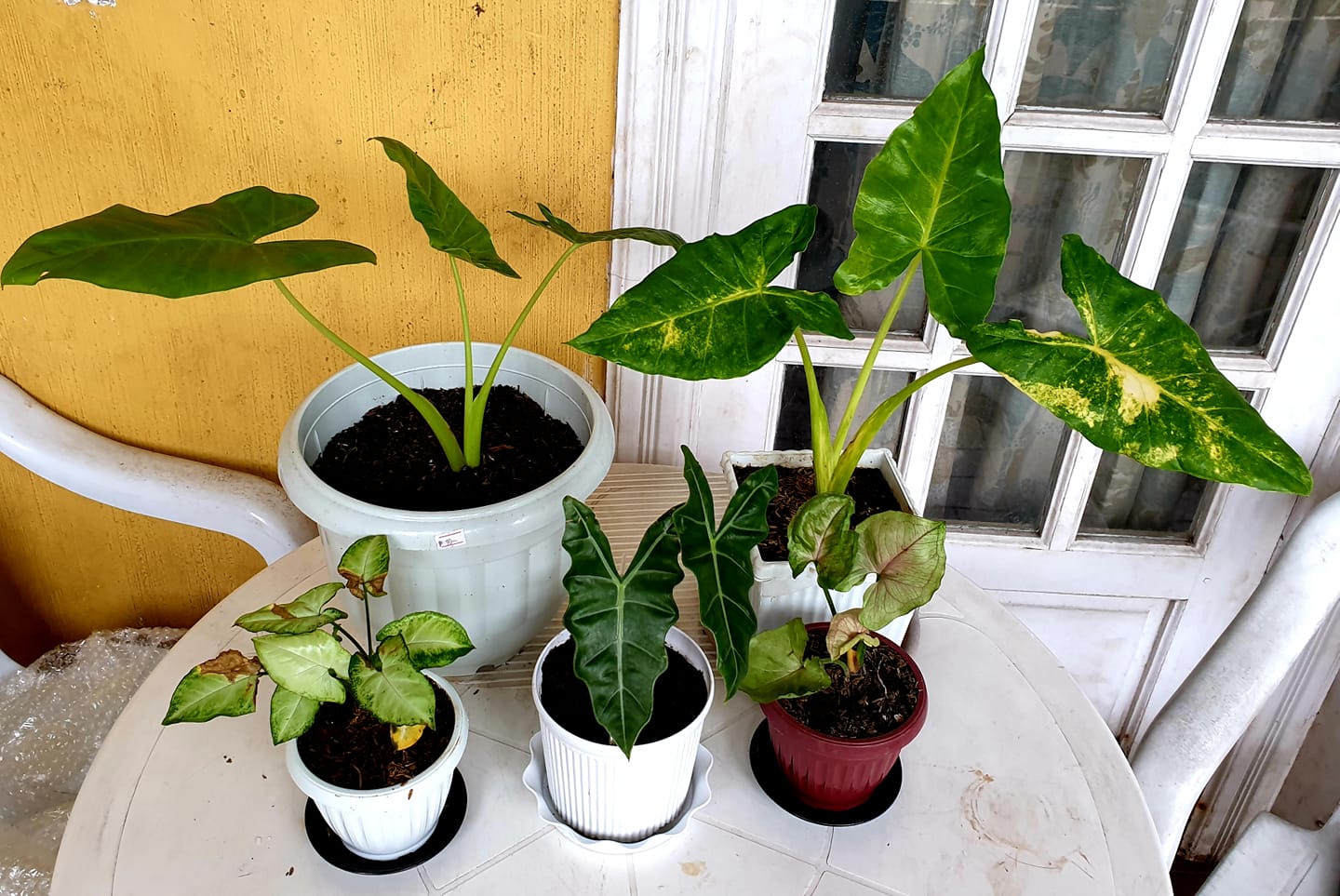
In the course of her recovery, Divine unashamedly claims to emerge from this pandemic as a “plantita”—a term used to describe a person who is into urban gardening.
In the case of Divine—now in her 50s, and whose fear of infecting her family was fortunately not realized—new hobbies came to fruition. When it was safe for her to go out of the isolation room, she took up gardening and experimented on baking and cooking.
So to speak, odds were in Divine’s favor. Krist*, on the other hand, seemed to have gotten the short end of the stick. On July 20, 2020, six days after he tested positive, his mother was identified to be a COVID-19 patient, too.
“Wala akong magawa kundi sisihin ang sarili ko… When I received my mother’s result from San Lazaro (Hospital in Manila), napahagulgol ako nang sobra… I don’t mind if nasa facility (World Trade Center in Pasay) ako and others might hear me pero ang sakit sa feeling na nag-positive si mama dahil sa akin,” Krist laments.
At that point, it was not only his sense of taste and smell that he lost. Anxious about the state of his mother—whom he claims to be more composed than he ever was throughout their experience—27-year-old Krist also began losing his will to carry on.
“Bigla na lang ako nagbe-breakdown dahil sabay-sabay kong iniisip ‘yung family, work, and buong buhay ko. I asked myself, ‘Will things ever go back to normal?’” he ponders.
In connection with these incidents of emotional turmoil, the National Center for Mental Health (NCMH) has revealed a significant increase in monthly hotline calls regarding depression, with numbers rising from 80 calls pre-lockdown to nearly 400. These figures form part of the 3.6 million Filipinos who are suffering from mental disorders amid this crisis based on a survey conducted by the Department of Health early this year.
In a post-pandemic world, to imagine that life can still return to how it used to be is more like a wishful thinking than a possibility. The unprecedented emergence of COVID-19 wreaked so much havoc that compels humanity to live in compliance with quarantine guidelines.
With MHP, open conversations on mental health are now part of the “new normal” in PS-DBM. Guided by the program’s principles that are non-discriminatory, confidential, rights-based, and sustainable, employees afflicted with mental health condition can rest assured that they are free from stigmatization and prejudice.
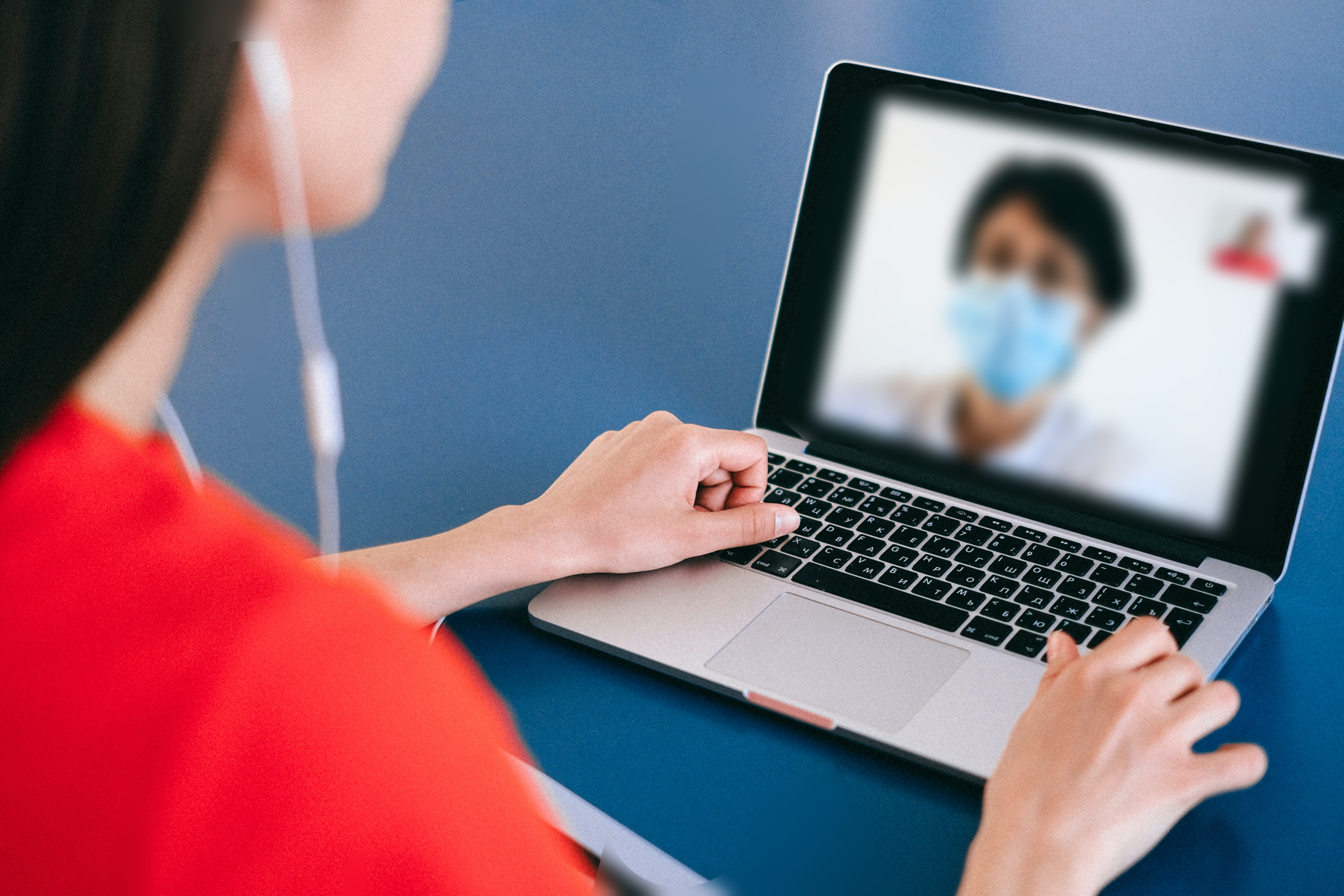
Communication is key especially in times of crisis such as this, as people are forced into a state of social isolation in an effort to mitigate the effects of COVID-19. | Internet photo (Pexels)
Maximillian, Divine, and Krist have all successfully recovered and were officially cleared of COVID-19 in April, July, and August, respectively. If there is one thing in common about their stories of survival, it is the undisputed fact that constant communication with and reassurances from family and friends bring about healing.
“I still have random episodes of emotional breakdown, but at least I know there are trusted people I can talk to without being judged,” says Krist.
Upon determination of their level of fitness to work again, PS-DBM provided them with reasonable working arrangements to resume their duties.
Their seamless reintegration into the workplace would not have been possible without a strong support system, which MHP facilitates through team-building, organized peer counseling, and interest group sharing, among others. These initiatives are a testament to the inclusivity of MHP that allows all employees to participate in mental health policy planning, legislation, service provision, monitoring, research, and evaluation.
The mobilization of these efforts is not for the sole purpose of bolstering PS-DBM’s mental health awareness, but also the Philippines’ fight against the pandemic. In the policy brief of the United Nations (UN) on COVID-19 and the Need for Action on Mental Health, UN states that “good mental health is critical to each country’s response to, and recovery from, COVID-19.”
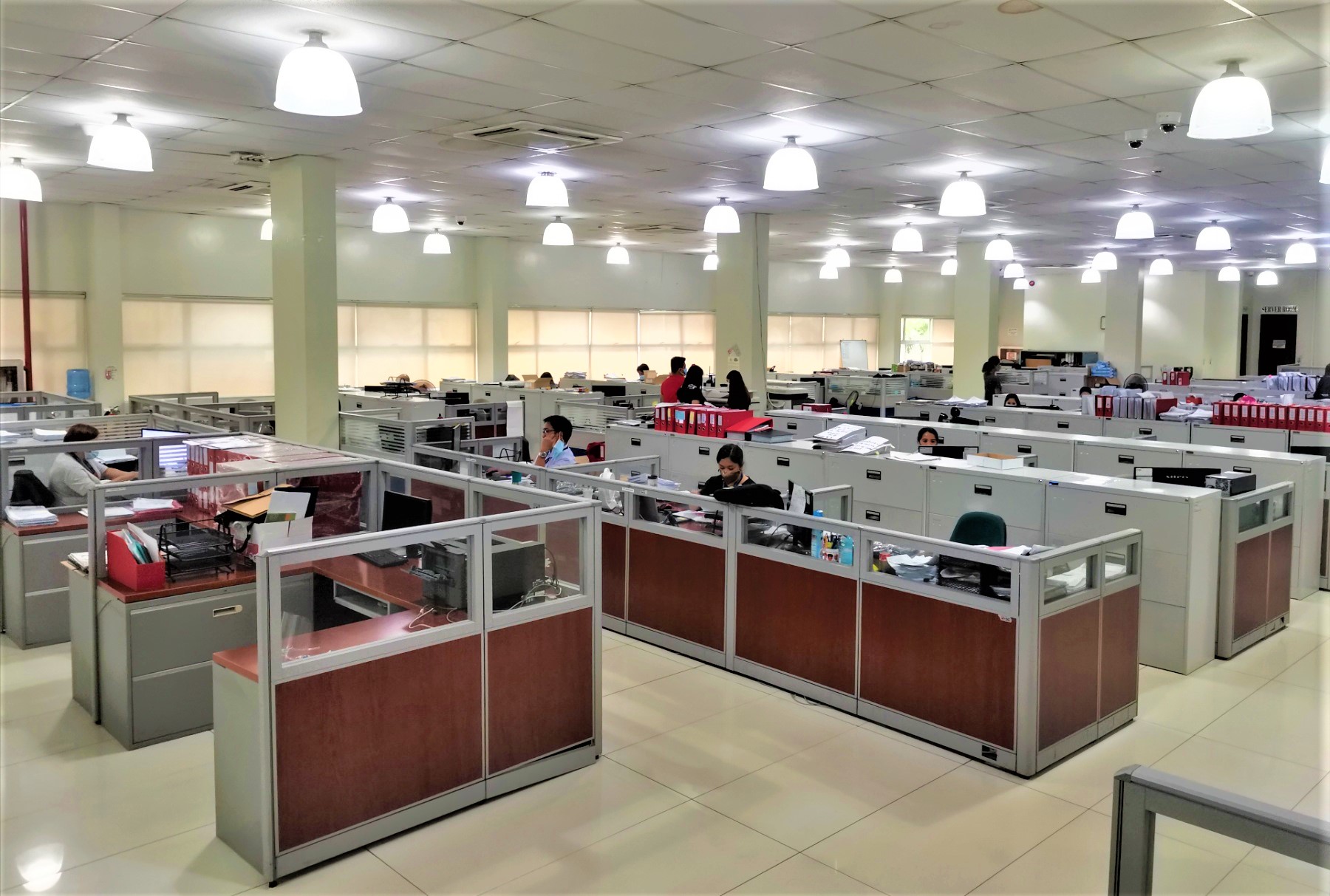
Since the outbreak of COVID-19 in March, a minimum number of PS-DBM employees as prescribed by the Civil Service Commission continue to physically report for work and render service in aid of its client-agencies.
In this time of uncertainty, the courage to continue living life every waking moment is already a fulfillment. If you have been looking for a sign to take a break, this is it.
With all the pressure, stress, alienation, restrictions, and other demonstrations of physical, emotional, and mental anguish, you ought to know that you have done more than enough.
You are enough.
For those who might be needing assistance for mental health concerns, please call the 24/7 NCMH Crisis Hotline 1553, 0917 899 8727 (USAP), and/or 7-989-8727 (USAP).
*Names of the subjects have been changed for their privacy.
